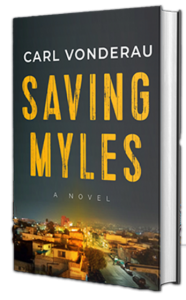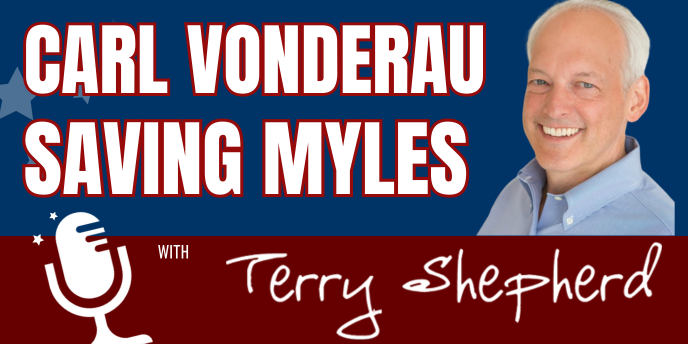Hear the Conversation | Get the Book
 Carl Vonderau’s path to literary acclaim is as winding and charged as the international thrillers he now pens. A Stanford-trained economist turned globe-trotting banker, Vonderau has lived in Canada, North Africa, and throughout Latin America, a background that informs both the cosmopolitan detail and moral complexity of his fiction. But it is in his second novel, Saving Miles, that the former financier lays bare something far more intimate: a father’s anguished reckoning with his own child’s suffering, and the high-stakes intersections of love, betrayal, and redemption.
Carl Vonderau’s path to literary acclaim is as winding and charged as the international thrillers he now pens. A Stanford-trained economist turned globe-trotting banker, Vonderau has lived in Canada, North Africa, and throughout Latin America, a background that informs both the cosmopolitan detail and moral complexity of his fiction. But it is in his second novel, Saving Miles, that the former financier lays bare something far more intimate: a father’s anguished reckoning with his own child’s suffering, and the high-stakes intersections of love, betrayal, and redemption.
At the center of Saving Miles is Wade, a successful La Jolla banker who finds himself thrust into chaos when his troubled teenage son is kidnapped in Tijuana. It’s a narrative that might scan, at first glance, like a classic thriller — cartel menace, shadowy banking deals, a race against time — but Vonderau, in the tradition of writers like Tana French or Dennis Lehane, is far more interested in what lies beneath the action: fractured families, generational wounds, and the fragile architecture of trust.
In conversation, Vonderau is disarmingly candid about the novel’s origins. “Twenty years ago,” he says, “we had to send my son to a residential treatment center.” That experience, long held in emotional reserve, became the raw material for fiction once his son gave him the go-ahead. “These kinds of decisions permeate the whole family,” Vonderau notes. “My stories are really about dysfunctional families and how they come back together.”
Indeed, Saving Miles is as much an emotional excavation as it is a plot-driven puzzle. Through the perspectives of Wade, his estranged wife, and their son, Vonderau probes the impossible choices that parents face: What if the very act of saving your child costs you their love? What happens when trying to do the right thing becomes indistinguishable from betrayal?
In one of the novel’s most potent arcs, Wade’s evolution from career-obsessed banker to desperate father is both external and internal. “He’s one of the few bankers who does yoga,” Vonderau jokes. Wade, we learn, has been quietly trying to re-center his life, to reconnect with his son through shared music, even as Miles plunges into darkness. When violence strikes, Wade’s transformation accelerates — not into a cartoonish vigilante, but into a man who must confront the very world he once compartmentalized behind double-paned glass offices and PowerPoint projections.
This intimate character work is balanced by a well-oiled plot, tight with tension and global in scope. Vonderau’s experience in international banking gives the narrative an authenticity often lacking in finance-related thrillers. Yet he is quick to admit his limitations. “I didn’t know a lot about money laundering,” he laughs. “I took courses on it.” The effort shows. His depiction of the underworld’s economic machinery — from shell companies to trade-based laundering — is both accessible and credible, never losing sight of its human cost.
That balance — between action and insight, pacing and pathos — is something Vonderau had to learn over time. His journey as a writer began covertly, composing fiction while working in conservative banking circles. “I didn’t tell anyone,” he recalls. “It wasn’t until I moved to Canada that I found a writing community.” From there, he migrated to San Diego, where critique groups, conferences, and the long apprenticeship of craft slowly transformed him from hobbyist to professional author.
Still, writing Saving Miles wasn’t straightforward. The novel weaves together three distinct points of view, and the structural demands — particularly after the central kidnapping is resolved midway through — required meticulous attention to narrative rhythm. “In most kidnap books, the return is the ending,” Vonderau says. “For me, it was the beginning of the real story.” It’s in that second half, after the son comes home, that the book becomes something deeper: an exploration of repair, guilt, and what it takes for a family to start over.
The novel also features a deftly drawn Mexican family with its own secrets and loyalties — a father who fled Quebec under suspicious circumstances and married into cartel royalty, a daughter bound for Stanford, brilliant and determined. Vonderau’s depiction of this family is no mere foil. It is an intricate mirror of the American protagonists: another clan shaped by love, power, sacrifice — and a brutal code of survival. “Cartel families revere the Kennedys,” he explains. “The father was a bootlegger, the son became president. That’s the dream. Their children must survive. Their children must have a better life.”
In many ways, Saving Miles is a novel about the strange currencies that bind us: trust, loyalty, redemption. And like money, those currencies are volatile. Characters defy outlines, voices break form. Vonderau confesses that even as he plotted meticulously, the story insisted on detours. “The wife took on a life of her own,” he says. “She kicks Wade out of the house, and people might least relate to her, but I understood her.”
By the end, Saving Miles refuses to let its characters — or readers — off the hook. Its catharsis is earned, not handed out. And its truths — about parenthood, regret, and the limits of control — linger well after the final page.
Vonderau’s next novel, he hints, is less plotted, more spontaneous — “I’m pantsing this one,” he grins — but still rooted in the same questions that drive his best work: What makes a family endure? And what does it mean to save someone, truly?
In Saving Miles, the answer is neither easy nor absolute. But it is, in every sense, worth the cost.

